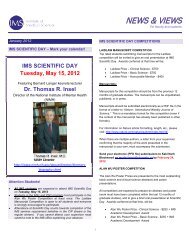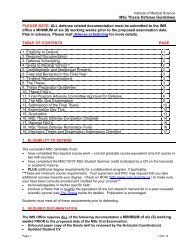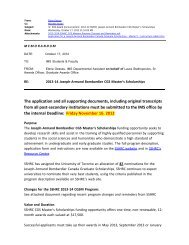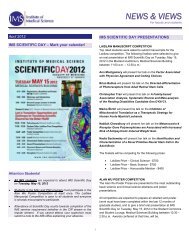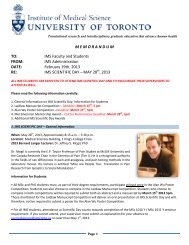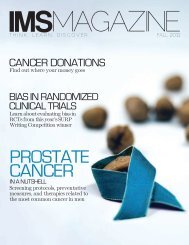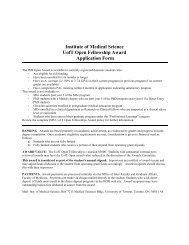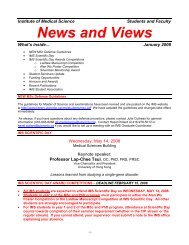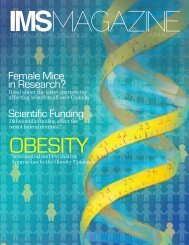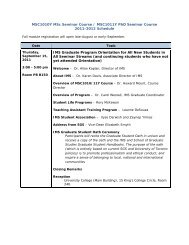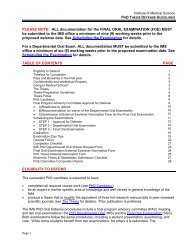IMS Magazine - Summer 2012 edition in PDF format - Institute of ...
IMS Magazine - Summer 2012 edition in PDF format - Institute of ...
IMS Magazine - Summer 2012 edition in PDF format - Institute of ...
Create successful ePaper yourself
Turn your PDF publications into a flip-book with our unique Google optimized e-Paper software.
VIEWPOINT<br />
A Numbers Game<br />
Why an article about statistics shouldn’t make you want to turn the page<br />
By Allison Rosen<br />
What do Chi-squared tests,<br />
t-tests and ANOVAs all have <strong>in</strong><br />
common? Some might contend<br />
that they are all statistical tests, but others<br />
will attest that they are all th<strong>in</strong>gs that give<br />
graduate students a headache. But why do<br />
so many students harbor negative attitudes<br />
towards statistics? These tests are there to<br />
help us—to validate our results and help our<br />
<strong>in</strong>terpretations. Right? The <strong>IMS</strong> <strong>Magaz<strong>in</strong>e</strong><br />
conducted a series <strong>of</strong> <strong>in</strong>terviews to provide<br />
a snapshot <strong>of</strong> what graduate students face<br />
when approach<strong>in</strong>g statistics.<br />
“I’m not comfortable with statistics.”<br />
<strong>IMS</strong> MSc Student Jack* pr<strong>of</strong>essed this view,<br />
and he certa<strong>in</strong>ly does not stand alone. Many<br />
graduate students <strong>in</strong>terviewed for this article<br />
confessed that they do not feel they have<br />
enough knowledge <strong>of</strong> statistics to perform<br />
the tests necessary to properly <strong>in</strong>terpret their<br />
experiments. Poor knowledge <strong>of</strong> statistics<br />
can have a big impact <strong>in</strong> graduate school.<br />
Jack expla<strong>in</strong>s, “It has made my ability to<br />
analyze and <strong>in</strong>terpret my own research data<br />
more challeng<strong>in</strong>g. I have had to teach myself<br />
th<strong>in</strong>gs along the way, or seek significant help<br />
from labmates and outside sources; it’s been<br />
… a def<strong>in</strong>ite source <strong>of</strong> frustration.” Another<br />
<strong>IMS</strong> student agreed with this sentiment: “I<br />
am only confident us<strong>in</strong>g very basic statistical<br />
tests that apply to my data,” claims Lauren*,<br />
a PhD student.<br />
“Statistical analysis is a huge part <strong>of</strong> my research.<br />
My limited knowledge on the subject<br />
<strong>of</strong>ten limits my <strong>in</strong>terpretation <strong>of</strong> my data<br />
and ability to clearly understand research articles,”<br />
Lauren elaborates. Jack confessed that<br />
although he has not yet been affected by his<br />
lack <strong>of</strong> adequate statistical knowledge, this<br />
problem will become more prom<strong>in</strong>ent as he<br />
prepares to defend his thesis. “We use a statistician,<br />
so really I just need to know how to<br />
make data look pretty <strong>in</strong> Excel.”<br />
But not all students share these negative<br />
views. Cor<strong>in</strong>ne Daly, who recently defended<br />
her MSc, and Richard Foty, currently work<strong>in</strong>g<br />
on his PhD, share their thoughts. “As an<br />
epidemiologist, I spend a good portion <strong>of</strong> my<br />
day analyz<strong>in</strong>g data or review<strong>in</strong>g articles, so<br />
over time I’ve gotten comfortable with the<br />
math. It’s the <strong>in</strong>terpretation <strong>of</strong> those results,<br />
however, that I am most <strong>in</strong>terested <strong>in</strong>. Statistical<br />
analysis is just the tool I use to get me<br />
there,” expla<strong>in</strong>s Richard. Cor<strong>in</strong>ne expands by<br />
expla<strong>in</strong><strong>in</strong>g that her familiarity with statistics<br />
has been helpful <strong>in</strong> understand<strong>in</strong>g rounds<br />
presentations, publications, and expla<strong>in</strong><strong>in</strong>g<br />
her research. “An understand<strong>in</strong>g and appreciation<br />
<strong>of</strong> statistics has been <strong>in</strong>dispensable <strong>in</strong><br />
my research career,” states MSc student Benjam<strong>in</strong><br />
Mora.<br />
Contrast<strong>in</strong>g feel<strong>in</strong>gs towards statistics aside,<br />
all <strong>of</strong> these students agree that know<strong>in</strong>g statistics<br />
is important. Amy*, an <strong>IMS</strong> student<br />
complet<strong>in</strong>g her MSc, expla<strong>in</strong>s that despite her<br />
discomfort with statistics, she understands<br />
its importance. “Better knowledge <strong>of</strong> statistics<br />
can help tremendously <strong>in</strong> understand<strong>in</strong>g<br />
papers beyond simple P-values; it allows for<br />
critical analysis, which is a skill all graduates<br />
need to learn.” Amy further elaborates on the<br />
level <strong>of</strong> statistical knowledge she believes to<br />
be necessary for graduate students. “Whether<br />
or not they complete their own analysis or<br />
send results <strong>of</strong>f to a statistician, I absolutely<br />
believe graduate students should be familiar<br />
with statistics—and I’m speak<strong>in</strong>g as someone<br />
who currently has very limited statistical<br />
knowledge. It’s difficult to gauge the exact<br />
level <strong>of</strong> knowledge needed, but I th<strong>in</strong>k it<br />
would be universally helpful to understand<br />
the various types <strong>of</strong> analyses available, and<br />
Photo courtesy <strong>of</strong> www.istockphoto.com; ID # 9015523<br />
33 | <strong>IMS</strong> MAGAZINE SUMMER <strong>2012</strong> GENOMIC MEDICINE



